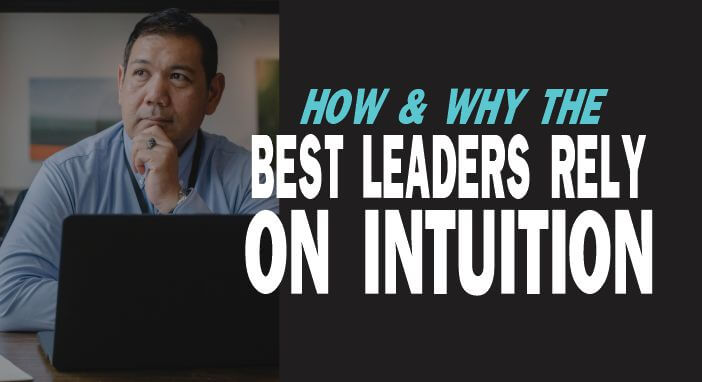Last updated on February 25th, 2025 at 03:00 pm
The best leaders rely on their intuition because it allows them to make quick and effective decisions, even in complex and uncertain situations. Here’s how.
You’ve probably had moments where a decision just felt right, even when logic couldn’t fully explain why.
That’s intuition at work. In leadership, intuition is more than a hunch, it’s an unconscious process that helps you recognize patterns, make connections, and act decisively.
Think about the last time you made a quick decision under pressure. Did you analyze every detail, or did your instincts guide you?
Leaders who trust their intuition often make faster, smarter choices, especially in situations where data alone doesn’t provide clear answers.
Science backs this up. Your brain constantly processes vast amounts of information, storing experiences and outcomes.
Over time, these stored memories shape your subconscious, allowing you to make snap judgments that seem almost automatic.
That’s why experienced leaders can walk into a room and immediately sense a problem before anyone says a word.
But trusting intuition doesn’t mean ignoring logic. The best leaders know when to lean on gut feelings and when to validate them with data.
The balance between intuition and analysis is what sets exceptional decision-makers apart.
Related: Signs You are Ignoring Your Intuition
Watch this Video: Do The Best Leaders Rely On Their Intuition? (11mins 5sec)
Why Intuition Matters in Decision-Making
However, research has shown that intuition is an integral part of our decision-making process.
Relying on intuition allows you to act swiftly, which is crucial when time is limited. If you hesitate too long, opportunities slip away, or problems escalate. Your instincts help you filter out distractions and focus on what truly matters.
Great leaders also use intuition to anticipate challenges before they arise. You might sense when a deal is about to fall apart, even if everything looks fine on paper.
Or you may recognize when an employee is struggling, even if they haven’t voiced their concerns. These subtle cues come from experience and emotional intelligence, both of which strengthen intuitive decision-making.
Related: What is Democratic Leadership?
Developing Stronger Intuition
You weren’t born with perfect instincts—nobody is. But you can refine your intuition just like any other leadership skill. Here’s how:
1. Learn from Experience
Every decision you make adds to your internal database of knowledge. Reflect on past choices, both good and bad. What worked? What didn’t? The more you analyze your past decisions, the sharper your instincts become.
2. Practice Pattern Recognition
Intuition thrives on recognizing patterns. Pay attention to recurring situations in your industry, workplace, or personal interactions. Over time, you’ll spot trends faster and anticipate outcomes with greater accuracy.
3. Trust Small Decisions
Start with low-risk choices. Follow your instincts on smaller matters and observe the results. Did things turn out as expected? The more you trust yourself in small decisions, the more confident you’ll become in high-stakes situations.
4. Stay Present and Observant
Your gut feelings are often based on subtle cues, body language, tone of voice, shifts in energy.
If you’re too distracted, you’ll miss these signals. Stay engaged in conversations, observe your surroundings, and listen actively.
5. Balance Instincts with Logic
Intuition shouldn’t replace logical thinking but complement it. Before making big decisions, take a moment to question your gut feeling.
Does it align with facts? If there’s a disconnect, dig deeper to understand why.
6. Embrace Uncertainty
Many people second-guess themselves because they crave certainty. But leadership requires making decisions without having all the answers.
Trust that your intuition is guiding you based on the best information available.
Related: Quiet Leadership: How Effective is it?
Real-World Examples of Intuitive Leadership

Many of history’s most successful leaders relied on intuition.
- Steve Jobs trusted his instincts when designing Apple products, even when market research suggested otherwise. His gut told him that simplicity and aesthetics mattered more than specs, and he was right.
- Warren Buffett makes investment decisions based on intuitive judgment as much as financial analysis. He often says he “feels” when a company has long-term potential.
- Oprah Winfrey has built an empire by following her instincts, choosing projects and partnerships that align with her values rather than just profit margins.
What do they have in common? They listen to their gut but validate their instincts with experience and knowledge.
Related: The Four Types of Leadership
When to Rely on Intuition—and When Not To
Not every situation calls for a gut decision. Some choices demand careful analysis, especially when numbers and data provide clear insights.
The key is knowing when to trust intuition and when to step back and assess the facts.
Rely on intuition when:
- You need to make a fast decision under pressure.
- You’re dealing with human emotions, relationships, or negotiations.
- The situation is ambiguous, and past experiences provide a strong reference point.
Step back and analyze when:
- You have time to gather data and consider alternatives.
- The stakes are extremely high, such as financial investments or legal matters.
- Your gut feeling contradicts known facts—this could indicate bias rather than true insight.
Overcoming Doubt and Fear
One of the biggest barriers to trusting intuition is self-doubt. You may fear making the wrong call or worry about how others will perceive your decision. But hesitation can be just as risky as a bad choice.
To build confidence in your instincts:
- Acknowledge past wins. Think about times when trusting your gut led to positive outcomes.
- Own your mistakes. Even the best leaders make misjudgments. Learn from them instead of fearing them.
- Surround yourself with trusted advisors. Get input from those who respect your instincts but also challenge you when needed.
- Stay adaptable. If new information arises, be willing to adjust your decision. Intuition isn’t about stubbornness—it’s about making the best call with what you know.
Frequently Asked Questions
Why is intuition important for a leader?
Intuition is important for leaders because it allows them to make quick and informed decisions, consider the bigger picture, and connect with their team on a deeper level.
Should the best leaders rely on their intuition?
The best leaders should rely on their intuition, but not solely. It should be balanced with data analysis and logical reasoning to make well-rounded decisions.
Should you rely on intuition?
Relying on intuition can be beneficial, but it should be complemented with critical thinking and evidence-based analysis to ensure sound decision-making.
Which is an example of people relying on their intuition?
An example of people relying on their intuition is when a leader trusts their gut feeling and makes a decision based on their instincts, even when the data suggests otherwise.
Is intuition a reliable guide for decision-making in leadership?
Intuition can be a valuable guide for decision-making in leadership. While it should be balanced with data and analysis, intuition allows leaders to consider subtle factors, make quick decisions, and tap into their experiences and instincts.
Can intuition be developed and improved in leadership?
Yes, intuition can be developed and improved in leadership. By practicing mindfulness, reflecting on past experiences, and actively listening to one’s instincts, leaders can enhance their intuitive abilities and make more informed decisions.
Should leaders solely rely on their intuition or also consider other factors?
The best leaders strike a balance between intuition and other factors. While intuition provides valuable insights, it should be complemented with data analysis, logical reasoning, and input from others. A well-rounded approach ensures more comprehensive decision-making.
The Bottom Line
Your intuition is one of the most powerful tools you have as a leader. It’s built from your experiences, emotions, and subconscious processing of the world around you. The best leaders know when to trust their gut and when to balance it with logic.
Next time you’re faced with a tough decision, pay attention to that inner voice. It might be guiding you toward the best possible outcome.
References:
- Great Leaders Trust Their Intuition
- Great Leaders Rely on Intuition For Their Most Important Decisions
- 4 Proven Reasons Why Intuitive People Make Great Leaders
- Business leaders rely on gut instinct more than data
Pyo Merez (PsyD) is a distinguished adolescent and adult psychologist at the forefront of mental health advocacy.
With expertise in cognitive and developmental psychology, focusing on social relationships, cultural contexts, and individual differences, Pyo has dedicated his career to empowering adolescents and adults.
As a sought-after speaker and panelist, Pyo shares invaluable insights on issues affecting young people, contributing to a deeper understanding of mental health and well-being in today's society.



Sure Nisee. Intuition is important for crucial decisions. Thanks for your commendation.